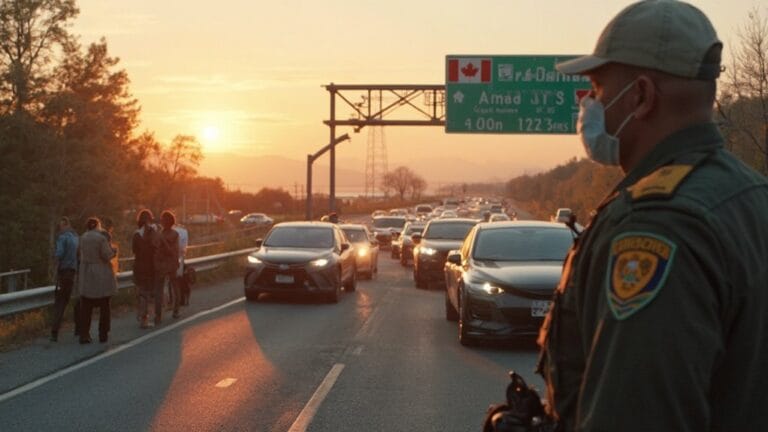When you’re planning cross-border travel, especially with kids, don’t forget their birth certificates—it’s a must! These documents prove your relationship and your child’s identity at the border, which can save you from major headaches. If your kids are Canadian citizens, they need a valid passport for air travel, while a long-form birth certificate works for land or sea crossings. If only one parent’s traveling, a notarized consent letter and custody papers are essential. Picture it: a smooth trip without the hassle! Curious about more tips to make this journey a breeze? Keep exploring for more insights!
Key Takeaways
- Birth certificates are essential for proving identity and relationship when traveling with minors across borders.
- Ensure to carry official copies of the child’s birth certificate for passport applications and identity verification.
- A notarized consent letter from the other parent is required if traveling with only one parent or guardian.
- For U.S. land or sea travel, children under 16 can use certified long-form birth certificates; passports are mandatory for air travel.
- Always prepare necessary custody documents and travel consent letters to prevent border crossing issues with minors.
Importance of Birth Certificates
When it comes to cross-border travel, birth certificates play an essential role, especially for families with children. You might not think about it until you’re packing up for a trip, but the birth certificate importance can’t be overstated. It’s a key document when applying for a passport, which you’ll definitely need for international adventures.
For those crossing the US-Canada border, if you’re traveling with kids under 16, a state-issued birth certificate is usually all you need—provided both parents are in the vehicle. Think about it: this little piece of paper proves your relationship and your child’s identity, easing your way through the border. Additionally, a birth certificate is considered an essential document for various legal and identity verification processes.
But remember, travel documentation significance goes beyond just the birth certificate! Since 2009, it’s no longer enough on its own for crossing borders. You’ll also need WHTI-compliant documents, like a passport or enhanced driver’s license. So, packing that birth certificate is just part of the equation. And don’t forget a consent letter if you’re traveling solo with your kiddos! Trust me, you don’t want to be that family stuck at the border because of missing paperwork. Happy travels!
Requirements for Canadian Citizens
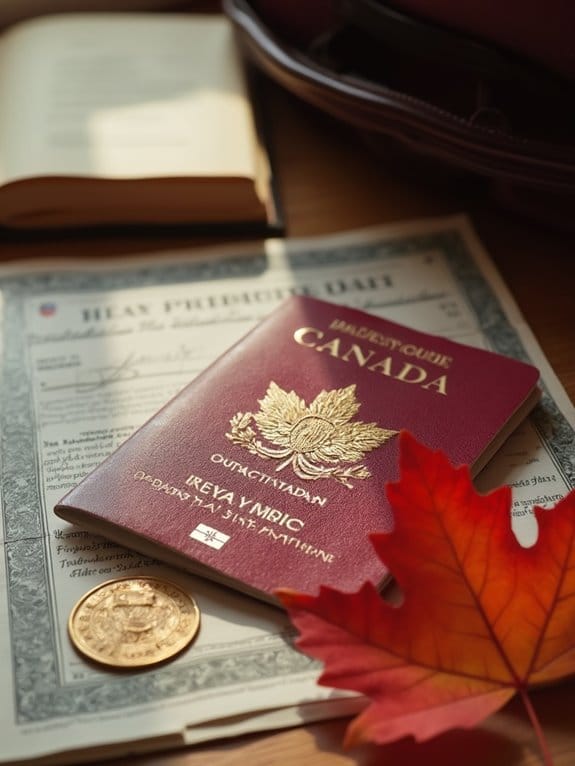
Crossing the border as a Canadian citizen requires specific travel documents, so it’s crucial to be prepared. The most recommended document is a valid Canadian passport, especially if you’re flying. For land and sea travel, you can also use Enhanced Driver’s Licenses (EDL), NEXUS cards, FAST cards, or SENTRI cards. These travel document types help speed up the process but remember, they’re not all created equal!
Now, here’s a border crossing tip: always carry valid identification and proof of citizenship, particularly if you’re traveling with minors. You wouldn’t want to be caught off guard, right? While a birth certificate can serve as proof for kids without other ID, it’s wise to verify all your documents are up to date for your trip duration. In fact, new document requirements were introduced on June 1, which necessitate specific qualifying documents for entry.
And if you have dual citizenship, don’t forget to travel to Canada with your Canadian passport! Trust me, it’ll save you a lot of hassle at the border. So, double-check your documents before setting off, and you’ll be on your way to enjoying your adventure without a hitch! Safe travels!
Documentation for Minors
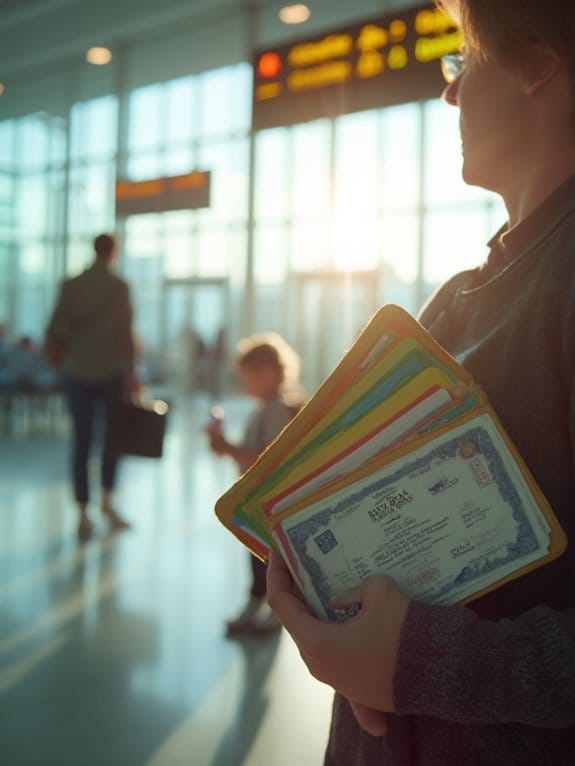
Traveling with minors across borders involves specific documentation to guarantee a smooth journey. First things first, you’ll need a Child Travel Consent, which is a notarized letter from both parents or legal guardians. This is especially important if you’re not traveling with the child. Imagine showing up at the border and realizing you forgot it—yikes!
Along with the travel consent, you’ll also want to bring an official copy of the minor’s birth certificate. This helps verify their identity and age, making the process easier. If you’re the only parent accompanying the child, don’t forget that notarized consent letter from the other parent, plus their contact info. It’s also advisable to have documentation proving your relationship with the child to avoid any potential issues.
Now, if you’re sending your child off with a third party—maybe a grandparent or family friend—make sure there’s a written permission letter from you, too. For divorced or separated parents, carrying custody documents is essential. If one parent has passed, a death certificate is necessary to prevent any misunderstandings.
Entering Canada With a Birth Certificate
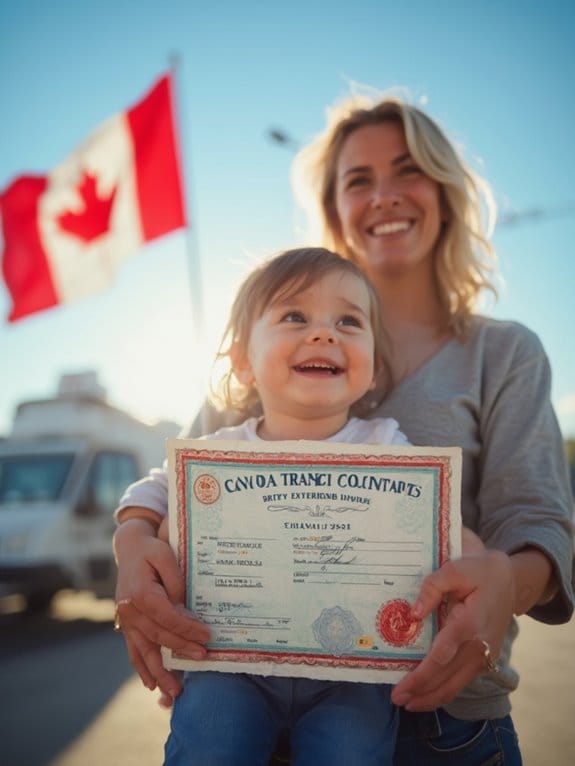
For families heading to Canada, understanding the use of a birth certificate as an identification document is important. It’s great news that a birth certificate is valid for Canadian-born individuals entering the country. However, if you’re planning to travel by air, you might want to think twice. A birth certificate alone might not cut it, and having some identification alternatives, like a passport or a government-issued photo ID, can make your journey smoother. In fact, for air travel, you’ll need one piece of government-issued photo ID to meet the identification requirements.
When traveling with kids, a birth certificate can be your best friend, especially when paired with a consent letter and parental IDs for land or sea crossings. But remember, air travel is a different ball game—those kids will need more than just a birth certificate!
US Entry Requirements for Children
When families plan trips to the US with children, it’s vital to know the entry requirements. You don’t want to be stuck at the border because of missing documents! For traveling families, the rules differ depending on how you’re crossing. If you’re going by land or sea, children under 16 can use an original or certified birth certificate. Just make sure it’s long-form, certified, and sealed, listing all the important details—full name, date of birth, and parents’ names. U.S. citizens must also present a valid passport when flying, as a birth certificate alone won’t cut it, so don’t forget that vital piece of document verification. For unaccompanied minors, parents or guardians need to provide their government-issued photo ID with a current address during check-in.
And a heads-up: Puerto Rican birth certificates issued before July 1, 2010, aren’t accepted, due to security upgrades. So, double-check everything before you head out, and you’ll be ready to enjoy your adventure!
Returning to Canada: Key Documents
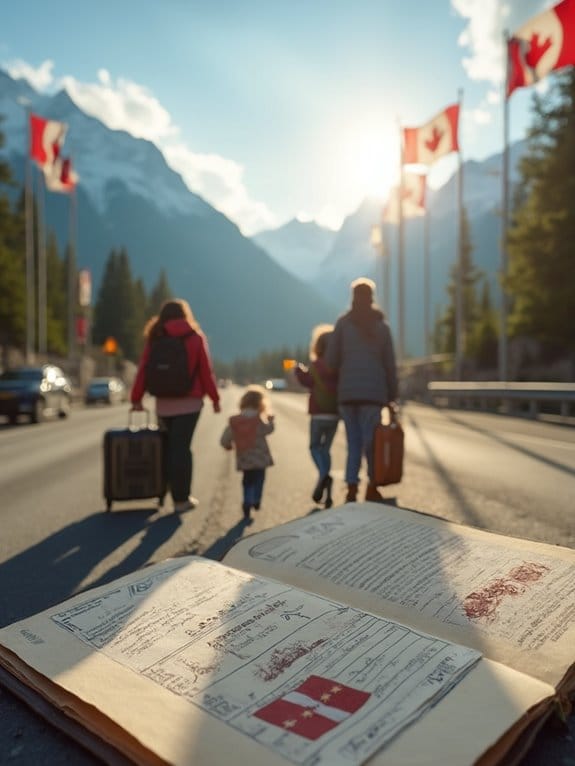
As you prepare to return to Canada, understanding the key documents required can help guarantee a smooth journey. First and foremost, you’ll need a valid Canadian passport. This is your golden ticket, especially for air travel, and confirm its validity isn’t about to expire—nothing like a last-minute panic, right?
If you’re a permanent resident, don’t forget your Permanent Resident Card; it needs to be valid too. You might also consider other acceptable documents, like an Enhanced Driver’s License, NEXUS card, or even a Certificate of Indian Status. Just remember, if you’re traveling with kids under 16, you’ll need their birth certificates or proof of citizenship, plus a consent letter if both parents aren’t traveling together. Additionally, U.S. citizens traveling to Canada also require valid travel documentation for re-entry, such as a passport or Trusted Traveler Program card.
Also, be ready to provide proof of financial support and details about where you’ll be staying in Canada. With travel restrictions constantly changing, it’s smart to double-check all these requirements before you hit the road. So, pack those documents, keep your passport handy, and get ready for a great homecoming!
Special Cases and Considerations

What do you need to know about special cases and considerations for cross-border travel? If you’re traveling with minors, there are a few important things to keep in mind. First off, you’ll need to have legal custody documents on hand, especially if you’re not traveling with both parents. It’s also essential to prepare a consent letter if your child is traveling alone or with just one parent or someone else. This letter should include contact details for the parents or guardians, just in case the border officials have any questions. To add an extra layer of security, consider getting that letter notarized.
Now, if you’re a dual citizen, having your valid Canadian passport is key. It guarantees you can access consular services while you’re away. Travel documents for minors may differ, and parental consent may be needed to ensure a smooth crossing. And if you’re pregnant, don’t forget about health insurance that covers everything from prenatal care to neonatal needs—trust me, you don’t want surprises! So, before you pack your bags, make certain you’ve got all your ducks in a row, from custody verification to travel health coverage. Happy travels!
Group Travel Documentation
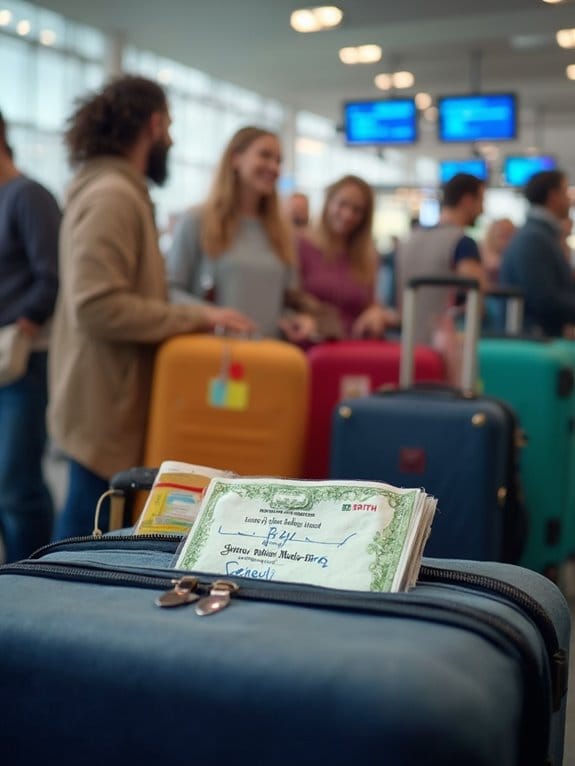
Traveling in a group requires careful documentation to guarantee a smooth experience for everyone involved. Whether you’re heading to a sunny beach or exploring a bustling city, proper travel planning is essential. First up, make sure everyone has valid passports—yes, even the kids! If you’re traveling with minors, don’t forget their birth certificates and, if needed, the Minor Departure Form (SAM) when they’re with someone other than their parents.
Now, let’s talk visas. Some destinations might throw a curveball with specific visa requirements, so check those ahead of time. A group authorization document can streamline your travel planning, listing all the significant info like itineraries and reservations. Plus, keeping your group coordinated is key—consider using a travel checklist to manage activities and accommodations effectively. Additionally, make sure to establish a plan for splitting group expenses to avoid any financial disputes during the trip.
And remember, health measures can vary, especially for minors, so doing your homework is essential. Finally, don’t forget travel insurance for peace of mind—it’s worth it! With the right documentation, you’ll be ready to enjoy your group travel adventure without a hitch. Happy travels!
Tips for Smooth Crossing

When crossing borders, having the right preparation can make all the difference. First things first, carry your valid passport—it’s your golden ticket for international travel. If you’re heading to the U.S., apply for the I-94 online at least seven days before your trip to speed up the process. If you’re traveling with kids, don’t forget those signed consent letters and custody documents; they’re essential for smooth sailing through border control.
Now, let’s talk crossing strategies. Avoid peak times like weekends or holidays—early mornings on weekdays are your best bet. Use the Border Wait Time app to find the least crowded entry points. If you have an RFID-enabled document, hit those Ready Lanes; they’ll save you time. Additionally, ensure you complete the Multiple Immigration Form (FMM) electronically for Mexico to avoid any delays at the border.
Oh, and a little border etiquette goes a long way: have your documents ready to show, complete any advance declarations, and keep your vehicle organized, especially when traveling with children. It’s like being a travel ninja! The smoother your crossing, the more time you’ll have for fun adventures on the other side. So, gear up and enjoy your journey!
Frequently Asked Questions
Can a Photocopy of a Birth Certificate Be Used for Travel?
A photocopy of a birth certificate usually isn’t valid as a primary travel document. You need to check travel document regulations to verify you have the appropriate original documents for your journey.
What to Do if a Birth Certificate Is Lost Before Travel?
Losing your birth certificate feels like losing a piece of your identity. Don’t panic; explore replacement options through your state’s essential records. Confirm other travel documentation aligns, so your journey remains smooth and worry-free.
Are There Age Limits for Needing a Birth Certificate for Travel?
Yes, there are travel age requirements. For international travel, children typically need a birth certificate alongside a passport. It’s crucial to check specific documentation needs based on the destination to guarantee smooth travel.
Can I Use a Hospital-Issued Birth Record for Travel?
You’d think hospital records would be a golden ticket for travel, but alas! They’re not valid under travel regulations for anyone over 16. Stick to official birth certificates to avoid heartbreak at the border!
Is a Birth Certificate Required for Domestic Flights Within Canada?
You don’t need a birth certificate for domestic travel within Canada. Instead, guarantee you’ve a valid photo ID or two pieces of identification showing your name, as that’s enough for travel identification requirements.





